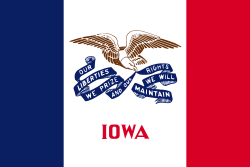 | |
Regional anthem of Iowa | |
| Lyrics | S. H. M. Byers, 1867 |
|---|---|
| Music | Melchior Franck, 1615 |
| Adopted | March 1911 |
| Audio sample | |
"The Song of Iowa" (instrumental) | |
"The Song of Iowa" is the regional anthem of the U.S. state of Iowa, written by S. H. M. Byers in 1867 and adopted as the official state song by the Iowa State Legislature on March 20, 1911. The song is set to the tune "O Tannenbaum" and Byers' lyrics' theme is centered on his love and praise for Iowa. [1]
